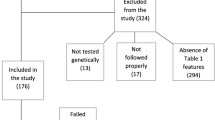Abstract
Familial Mediterranean fever (FMF) is an autosomal recessive disease predominantly affecting Armenians and non-Ashkenazi Jews. The disease begins in childhood with paroxysmal attacks of pain and fever accompanied by peritonitis, pleuritis, and synovitis. During the acute phase, there is a massive influx of polymorphonuclear leukocytes into the serosal membranes, connected with degranulation of the neutrophils and with secretion of lysosomal enzymes and pyrogenic substances. An increase in the lipoxygenase product, leukotriene B4, a chemotactic agent, and a decrease in the activity of the inhibitor of chemotaxis, C5a, in serosal fluids have been considered responsible. Previous work from our laboratories had shown that the chromosomal instability observed in blood cultures of patients with FMF is secondary to circulating clastogenic factors (CFs), and that the antioxidant enzyme superoxide dismutase, as well as lipoxygenase inhibitors, reduce the chromosome damaging effects. CFs are observed in chronic inflammatory diseases and in various other pathological conditions accompanied by oxidative stress. Similar clastogenic materials were found in supernatants of neutrophils and monocytes after a respiratory burst and were shown to contain lipid peroxidation products and cytokines. In the present study we compared the clastogenic effects exerted by plasma ultrafiltrates from 20 adult patients with FMF to the unstimulated O2 – production of their neutrophils. In comparison to 20 age- and sex-matched controls, which were studied simultaneously, the O2 – production by patient’s neutrophils was routinely higher than that of controls. The clastogenic effects of patient’s plasma, expressed as the number of chromosomal aberrations induced in test cultures of healthy donors, were correlated with the importance of O2 – production by their neutrophils (r = 0.5235). Even if the relative contribution of disturbance in arachidonic acid metabolism, neutrophil activation, and CF formation in the disease process remains unclear, the demonstration of oxidative stress in this genetic disorder suggests the use of antioxidants and free radical scavengers, in particular during acute attacks, when the classical colchicine treatment is without effect.
Similar content being viewed by others
Author information
Authors and Affiliations
Additional information
Received: 15 June 1997 / Accepted: 18 July 1997
Rights and permissions
About this article
Cite this article
Sarkisian, T., Emerit, I., Arutyunyan, R. et al. Familial Mediterranian fever: clastogenic plasma factors correlated with increased O2 –– production by neutrophils. Hum Genet 101, 238–242 (1997). https://doi.org/10.1007/s004390050623
Issue Date:
DOI: https://doi.org/10.1007/s004390050623




